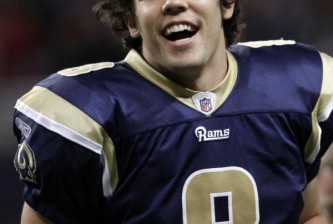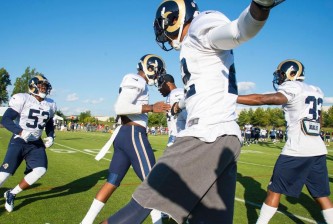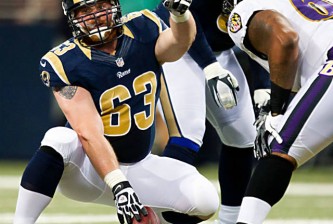Syllogisms are often used to form conclusions in sports. For those that do not study logic, a syllogism is a form of a logical argument where the conclusion is inferred from two prior statements. An easy example is:
All humans will eventually die.
All football players are humans.
All football players will eventually die.
After the last two games, I began asking myself whether the following syllogism is true:
Michael Brockers played without injury in the Arizona and Miami game.
The Rams run defense improved dramatically in the Arizona and Miami game.
Michael Brockers improved the Rams run defense.
The title to this article is the conclusion of the above syllogism. I put it in the form of a question because I am a naturally curious person. I like to know the answer to the question why. Therefore, I went back and watched every run play in the Arizona and Miami game.[1]
The Arizona Cardinals wanted to run the ball against the St. Louis Rams. They were lucky to get 45 total rushing yards. Miami was planning on “taking advantage” of the Rams poor run defense. The Dolphins ran the ball 18 times for a whopping 19 yards. Therefore, the first two statements of the syllogism are true. However, after reviewing the film, it is difficult to say that Michael Brockers is the one person who is responsible for the improvement.
When there is a big play against the football team, fans generally look for the one guy that caused the problem. When things are going well, fans typically want to point to one guy (ex. Ray Lewis) and say he caused the greatness. The hero/goat theory of football makes analysis easy. Unfortunately, many lazy radio talk show hosts and national analyst resort to this simplistic approach.
In this case, it is impossible to say that the run defense improved due to any one person. At the same time, fans should be excited to know that the entire defense is playing well, including Michael Brockers. They are doing their job, which allows the right person, in the right place to make the play.
I will give a few examples to justify my conclusion that it is the team, not an individual. To begin with, the Rams have a fairly obvious rotation on the defensive line. Brockers plays with Langford, and Heard plays with Cudjo. Sims often comes in at defensive end. Therefore, no one person on the line is responsible for the improvement in run defense.
Moreover, multiple people made multiple good plays to shut the running game down in both games. I will use the Miami to give some specifics. In the second run by Reggie Bush (at 5:08 in the 1st quarter), Brockers and Quinn did a great job of cutting off the edge. Bush saw that he had nowhere to go. He tried to change direction, but was tackled by Langford for a 5 yard loss.
At 6:13 in the second quarter, Hayes, Dunbar and Sims combined for an excellent play to stop Bush for no gain. Hayes, got the tackle, but Sims and Dunbar caused Bush to head towards Hayes and were involved in the tackle.
At 14:53 in the third quarter, Reggie Bush was stopped after a two yard gain. Finnegan and Dahl both attacked through the same hole. It appears that Dahl was blitzing. Finnegan, on the other hand, had coverage responsibility, but he noticed the run immediately. His quick response was quite impressive. Dahl got the credit for the tackle, but Finnegan’s fast response allowed Dahl to get in untouched.
At 12:38 in the third quarter James Laurinaitis stopped Bush in his tracks for only a one yard gain. However, after watching the play on film, it is impossible to ignore how well Langford and Brockers handled the play. Within a millisecond of Laurinaitis stopping Bush in his tracks, Langford and Brockers grabbed hold of Bush from opposite sides. Laurinaitis got the credit for the tackle, but Langford and Brockers were certainly involved.
I hope you get the point. This entire defense is manning up to stop the run. In most situations in the NFL, rarely is one guy the reason for all of the good or all of the bad. At the same time, I would love to see how well the defense can play if Brockers gets to the point that he demands a double team.
I should note that I was generally impressed with Brockers’ play. In the Miami game, I could only see one situation where he was moved by the guard (often Incognito) from the place he wanted to be. There was also one situation in the Miami game, where he literally tossed his blocker to the side and got into a play. At the same time, Brockers had no tackles in the Miami game and did not require double teams. If he is not going to have any stats, then he better occupy multiple blockers. Otherwise, he is just another defensive tackle. As a first round pick, he can’t be just another defensive tackle. Therefore, this is something I will watch the rest of the season.
[1] I did not include the Seattle game. Brockers returned in the game, but he was still having injury limitation and, in fact, left the game with an injury concern.






















